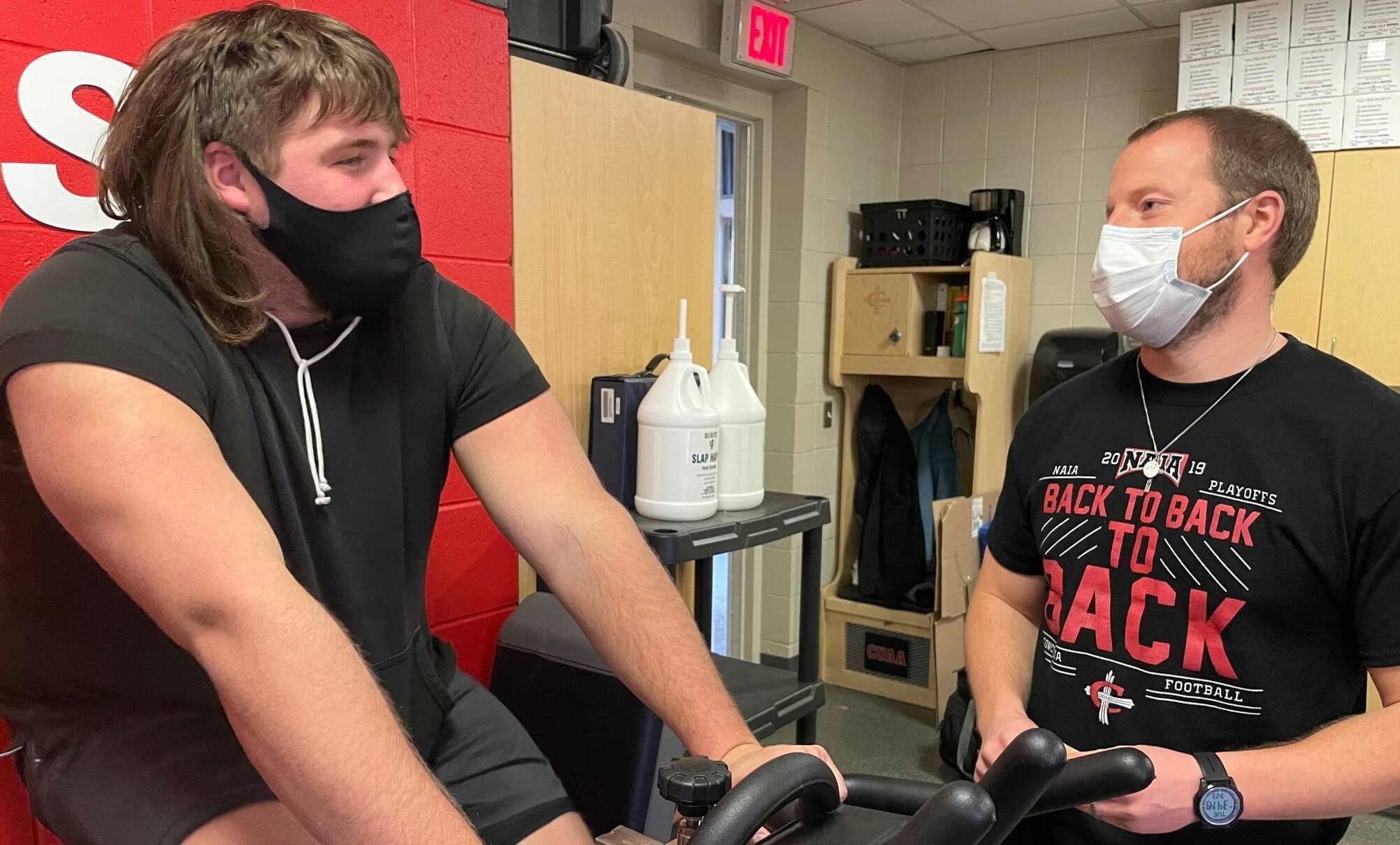
Head Athletic Trainer Peter Benjamin and his team help keep athletes going strong in tough times.
With all they do to help student-athletes stay healthy, deal with stress, and perform their best, athletic trainers probably deserve a lot more shout-outs than they usually get (even during National Athletic Training Month). Throw a global pandemic into the mix and they become some of the true unsung heroes of an athletic department.
Just because competition shut down when the pandemic hit, that didn’t mean athletes stopped training. And they still had injuries that needed attention. Not only did the athletic training (AT) team at CUAA have to develop new ways to treat athletes, they also stepped up to help mitigate the spread of COVID-19 on campus.
“So it turned from an in-person treatment and rehab approach to a lot of virtual attention, checking in with athletes to make sure they’re recovering from injuries,” said Peter Benjamin, CUAA’s head athletic trainer who joined the Cardinals athletic department staff in 2019. “We’ve also taken over for doing a lot of the COVID assessments for athletes. If they have any sort of COVID symptoms, we provide assessments and recommend if they should be tested or quarantined. And we do a lot of contact tracing. These are areas we don’t have a lot of experience in, so we had to get up to speed very quickly.
“The team responded great! They have really stepped up,” Benjamin added. “This is what we do. And we knew this was something we had to do if we wanted athletics to happen.”
A Long Road
Once it became clear that COVID-19 wasn’t going away any time soon, the school and its affiliated athletic conferences made the decision to push the fall athletic seasons into the spring. Even so, the teams, the campus, and much of the state of Michigan had to get through an outbreak in November that shut things down once again. They weathered the storm while looking forward to the spring semester to get things closer to “normal.”
So now, virtually every athletic team is competing at the same time, putting extra pressure on the department to perform.
Fortunately, along with that pressure comes an extra surge of adrenaline.
“I think you kind of have to rise to the occasion, or else you’re just going to burn out,” Benjamin said. “There have been times when we’ve looked at the schedule and wondered how we’re going to handle it all. Then we think, ‘Let’s just take it a day at a time.’”
It helps, as well, to have a healthy number of trainers on staff, including student trainers from CUAA’s own AT program, as well as partnerships they have with both the University of Michigan and Eastern Michigan University. In addition to a larger staff, these partnerships give the team a variety of fresh perspectives, as well.
“We’re very fortunate to get students from different educational backgrounds, as well as just having additional help with all the sports,” Benjamin said.
Benjamin said he knows of other programs that have been forced to make cuts during the pandemic. Not so at CUAA, where the administration has been steadfast in recognizing the vital importance of what the AT team provides. Both on and off the field.
“Our athletic training staff selflessly cares for our student athletes in remarkable, compassionate, and uncommon ways,” said Dr. Ryan Peterson, CUAA’s Vice President of Administration. “They work hard every day, but with so many additional teams practicing and competing this spring, they have gone above and beyond to serve. I am deeply grateful for the critical role they play as trusted medical professionals and Christ-centered examples for each one of our students.”
And because it’s not just about dealing with physical injury and disease; mental health management is a vital component, as well.
“It’s very stressful to get hurt,” Benjamin explained. “And while some athletes take it in stride as part of the process, for others, it wrecks them. So we definitely address the mental health side of things and can refer students to get outside help if they need it.”
Better Days Ahead
With vaccination programs in full swing across the country, it’s starting to feel like there’s some light at the end of the tunnel, Benjamin says. As some teams, such as football, are just gearing up, others are wrapping up their rescheduled seasons. Things should get a little easier again from here, but there’s still lots of work to do. And so many people to thank.
There’s Pastor Ryan (Peterson), who cares so much about athletics and “has been fantastic as our campus leader,” Benjamin said. And athletic director Lonnie Pries, who has provided continuous support, checking in on the AT staff while “doing a great job as athletic director.” There’s Tim Neal and Amber Melick, who give the student trainers such a great education. And the staff he works with every day, including Kasey Ficken, Matt Walker, Nick Peters, Sammie Hagedon, Beth Kuhl, and others who have stepped up and filled in.
The coaches and athletes have been outstanding, as well, Benjamin said. “I could go on and on. I love working here. It’s a great atmosphere, with a strong spiritual foundation, and fantastic people to work with.”
In other words, just the kind of place you want to be working when the going gets tough.
Interested in becoming an athletic trainer? CUAA offers a master of science in athletic training, a 5 year professional program that prepares students to confidently enter an athletic training career.
—
If this story has inspired you, why not explore how you can help further Concordia's mission through giving.